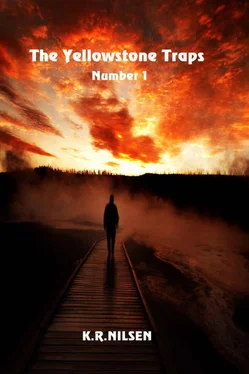Young Petah brought bowls of steaming buffalo stew for White Elk and the white woman she sometimes called Piksi , or bird in the Blackfoot tongue. Liz was the woman who flew down from the heavens, so Piksi would be her nickname.
“How are you feeling this evening?” Petah asked White Elk, who had managed to sit up in his bed in the ward created from an old storehouse in Stand-Off Creek village.
White Elk gestured for a bowl of buffalo stew. He wanted to hold it in his own hands so he could feed himself. “I am much better today, thanks to you and your mother, and to my new friend, Elizabeth. Sinopa put my bones back together. The two of you put my spirit back together. If you were not my companions these long days, I would not be mending so fast.”
“I think you will be on your feet in a few days,” offered the young woman.
“I hope that will be so, Petah,” replied White Elk while sampling his dinner.
The Blackfoot doctor left White Elk in the care of the woman who fell from the sky. Now able to get around on her own and wanting something useful to occupy her time, Liz had asked Sinopa if she could help care for White Elk though the course of his convalescence. The doctor was happy to oblige, so the scientist spent much of her time tending to White Elk’s needs and in so doing had become fond of the elderly gentleman.
This evening, though, Liz was long in the jowls. White Elk could see that she was pensive.
“You are troubled, Elizabeth. I think so. Your body has mended but your spirit is not whole.”
Liz marveled at the wisdom of the Native American elder. “Am I that transparent, Benjamin?”
“Your trouble is riding trails all over your face. It shows me that you are mourning for your little one and your life with her.”
“I’m conflicted. I want desperately to see Pelee. But, I’m ashamed to say, I long to get back to Yellowstone to see what impact the great eruptions had. If I told you that I love my daughter, but dread the life we had together in Boston, what would you say?
“That does not surprise me. I have not met a White who was at ease with his lot. You are no different.”
“I am not at all at ease, Benjamin. I don’t think I can articulate why that is.”
“Maybe I can do that for you.” The elder raised an arm and turned the palm of the one hand up toward the ceiling, then turned the palm over. “There is a concept among native peoples, Elizabeth. The Hopi people of the Southwest even have a word for it. It is about the peculiar culture of discontent the Europeans brought with them to this continent. The Hopi say koyaanisqatsi . Do you know what that means?”
Liz shook her head. “I have no idea.”
“It means ‘life out of balance.’ The Europeans came to America with customs that were koyaanisqatsi , out of balance with their neighbors, with all other peoples, with the world of nature. They imposed their culture on all of us, the 500 native tribes of the continent. Their way of life defeated us as surely as the smallpox and the gunpowder they brought with them.”
“I feel like that, out of balance,” said Liz. “I haven’t seen my daughter for months. We live in an apartment across the river from Boston. It should be a happy place. There is all so much to do, so much stimulation. But Pelee wants to live on the experimental farm in Minnesota founded by my husband, that is to say, my former husband. We’re divorced. Pelee is unhappy in Boston. I am distraught that she is so unhappy.”
“And your husband? What happened to him?”
“His name is Abel. We separated less than two years after Pelee was born—purely a twenty-first century split: two separate career paths, two strong-willed parents with terrific prospects going nowhere together. We actually loved one another, cared for each other, we did. But he was a rising counter-culture star trying to make his ideas, his writing, a three-dimensional reality. I was immersed in the most exciting science imaginable and had offers to teach at the university level. Love or not, we agreed to go our separate ways. I walked away with Pelee and my maiden name. No fights. No legal struggle, just mutual consent on everything. It was easy, really. Maybe too easy.”
“Why does your daughter want to live with this man and not with you?”
“She loves the farm, the animals, the people there. It is not a typical farming arrangement, you understand, where one family tends a few hundred acres. It’s more like a big community farming experiment, something like a commune or an Israeli kibbutz. It has something of a pioneer spirit about it. She likes that. She knows everyone there. It’s a tight-knit, self-sufficient world with lots to do: fun, real chores, friends, lots of time outdoors in the woods, farm fields, greenhouses and gardens, those sorts of thing. It’s like a big extended family, something I can’t give her.”
“And do the people there have a single purpose—they work together for the benefit of all who live there?”
“Yes, I would say so.”
“Then it is not surprising that your child wants to live there. You would be happy to live such a life, too.”
“Oh, I couldn’t adapt to that life. I like my space. I love the melting pot of a city, the intellectual community, the science, the stimulation.”
“That is not what your face is telling me.”
“Really?” A frown pulled on Liz’s lips. “What do you think it is telling you, Benjamin?”
“Your spirit does not want, as you say, space. You tell me you live in a box in Boston, when you could live in community with your daughter. She does not want space. She does not want isolation, I think. Her spirit is longing for inclusion, where she may share her days with you among like people, people you can both call your own. I think you want serenity, stability, security and purpose that come from life within the circle of community. You want that. White Americans are desperate for it, but they are the farthest from it. Now why is that?”
“I was hoping you would tell me.” Liz smiled. White Elk returned the smile.
“I think I know why. My ancestors lived a life of custom and tradition handed down through the generations for thousands of years. They did not reel from one new fad to the next like drunks, yet their lives were not one of cliché about the noble savage, you know, living out some idyllic fantasy in a Garden of Eden. They got sick. They had domestic squabbles, stole from neighboring tribes, waged war. But they lived well for millennia in small nomadic groups following the buffalo herds, in step with the seasons. They were, for the most part, a stable and self-reliant people, at peace with themselves and the natural forces around them.
“All over the world, even today, people live best when they live in small social arrangements. You spoke of one, the one your daughter wants to live in. Do you know what you described for me?
“No, what?”
“You described a tribe. Your daughter wants to live as a member of a tribe. And so do you.”
Liz issued a nervous laugh. “I don’t know where you’re going with this.”
“I think you do. I will tell you, if you will listen.”
“Oh, I’ll listen to you, Benjamin, but I must tell you, I’m more than a bit skeptical.”
“Well, then, I will give you a modern example, very up-to-date. Months ago, before Yellowstone brought the ash and the cold, I saw on television something remarkable.”
“And what was that?”
“It was a televised sermon delivered by an evangelical minister in the West. They call him a… televangelist, I think is the word. I was not interested in the message he was preaching. He was on a stage ministering to 10,000 people sitting in what I first thought was a stadium. Only the stadium was a church; it was that big. It is in southern California, I remember. The gathering looked like a concert for the rock music. That is what captured my interest.
Читать дальше










